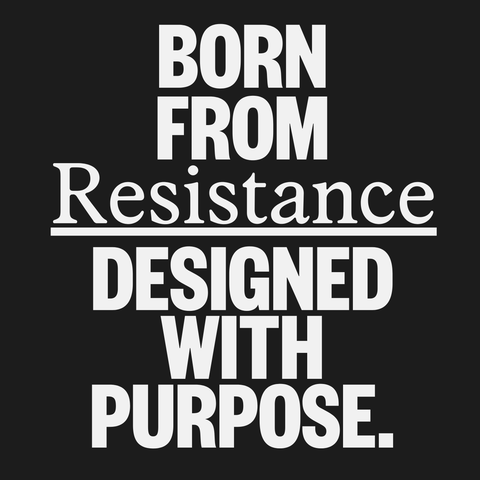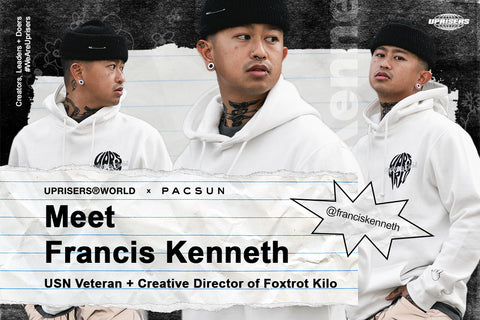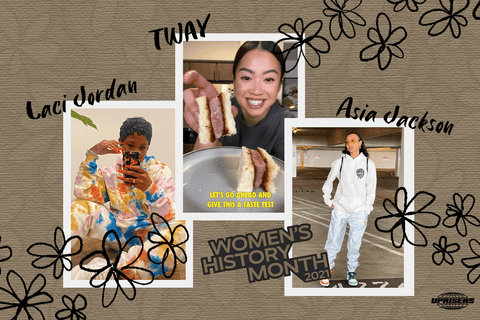The professional figure skater turned actress Tetona Jackson breaks down her passions for acting and the need for representation.
UPRISERS: How did you get started partnering with UPRISERS and founder Michelle K. Hanabusa?
Tetona Jackson: I've actually known Michelle for years. We kind of grew up figure skating together. And obviously, you know, once we got older, she went into her field and I went into my field. It was a few years back that we came in contact again. She told me she had a line. And obviously, I'm super supportive in anything she does. That's kind of how everything I started. I saw the line and fell in love with it instantly. Especially the most recent line she did, which was the Power to the People– I really, really loved with everything happening at the time. Ever since then, we've been staying in contact.
Do you remember which was your first campaign?
I think it was the Power to the People. Yeah, I think that was the first one. I was following her line and everything, but I think that was the first. Well actually, no, I'm totally lying. That was the first one we did a collab on, but I think it was last year for the BBC Awards, she dressed me and for one of the events I wore one of her shirts. The day before the awards ceremony, I had a bunch of press and everything and so for that day I wore her line.
How do you feel about the way in which Michelle and UPRISERS are so vocal? I know as a woman of color in the industry, representation is a huge thing. What are your opinions?
Honestly, I love it. I think it's so inspiring to see not just a woman, but a woman of color. First of all, be doing such a big thing and to be so vocal and speak up for so many people. I think it's really dope and it's really powerful what she's doing. And right now is the time to be doing it– she's cooking it up.
I think it's a big thing, you know, just standing up for myself, my morals, what I believe in, what I'm comfortable with. There's so much in this industry. There's so much happening. It's really easy to get lost in your thoughts and forget about what you want because, you know, so many things that you don't necessarily agree with are normalized and you just feel like you should just go with the flow. But I think, it's one of the things that I have learned and I'm still practicing in this industry is if I'm not comfortable with something or if something does not suit me, then I need to stand up for what I believe in and I need to speak up how I feel. It's scary and difficult at times, but again, it's something that I'm practicing as time goes by. I think it's something that everyone, industry or in general, should practice and should learn to put their foot down and vocalize: hey, this isn't OK, this isn't right.

Being a public figure and in acting, what would be your 'why' to wake up every day and do this job?
I mean, first and foremost, I love what I do. I love acting, so it's something that I'm very passionate about. But also for me being I guess, quote unquote, influence or being in the public eye one of the things that I wanted to put out there that was difficult for me growing up and I want to change is it's OK to be yourself. It's OK to not look like everyone else. It's OK to not fit in. I'm mixed race, I'm Persian and black. So growing up, it was one of those like: where do I fit in? I'm a black person, I don't quite fit into either one of those worlds fully, and I kind of had like this identity crisis. And I think the older I get, the more I'm like, it's OK. It's OK not to fit in. It's OK to be yourself. It's OK to be outside the box. It's OK to not look like everyone else. And that's something that I wanted to let the younger generation know that it is OK to not be like everybody else.
How did you transition from figure skating to acting?
Well, I had always known at a young age, I had always been pretty much in love with anything entertainment. My dad's a jazz musician and my aunt is a flamingo dancer. I grew up in that world. It was always very exciting for me, you know, being able to sit backstage at my dad's gigs watching Aretha Franklin and all these people. It was very inspiring. At a very young age, I knew I wanted to do something in entertainment. And I was always very intrigued by acting. I thought it was really cool that you get to put on a different persona for the day and then go back to your real life. I knew eventually I wanted to end up as an actress, but the journey getting there was kind of just like all over the place, which is also amazing because I got to experience so much and I learned so much.
I got an offer straight out of high school to go on tour with Disney on Ice. And I was like, how can I say no? I get to travel. I get to make money doing something that I have trained my whole life for something that I love to do. But slowly throughout the tour, I was on tour for about four or four and a half years, I just caught myself realizing that I'm not as happy as I should be. I am missing something. I knew that it was time for me to make that transition and it was a very scary transition because you're going from a world where you're well known, making good money, having a secure job to, honestly, just starting from scratch. And when I came back home, there was an overlap of like I was assigned to a dance agency and doing some dance gigs on my breaks from tour. And then I dabbled in music for a little bit. But ultimately I got into an acting class and kind of went from there.
If there's a message you can say to the younger generation or to your younger self in regards to representation and fighting for what you believe in, what would be your message?
It's really scary. It's really f*cking scary. I know that because I am still practicing and I'm still living and I'm still, you know, trying to conquer it, but don't let people push you around, don't take things because you feel like you need to not stand up for what you believe in.







